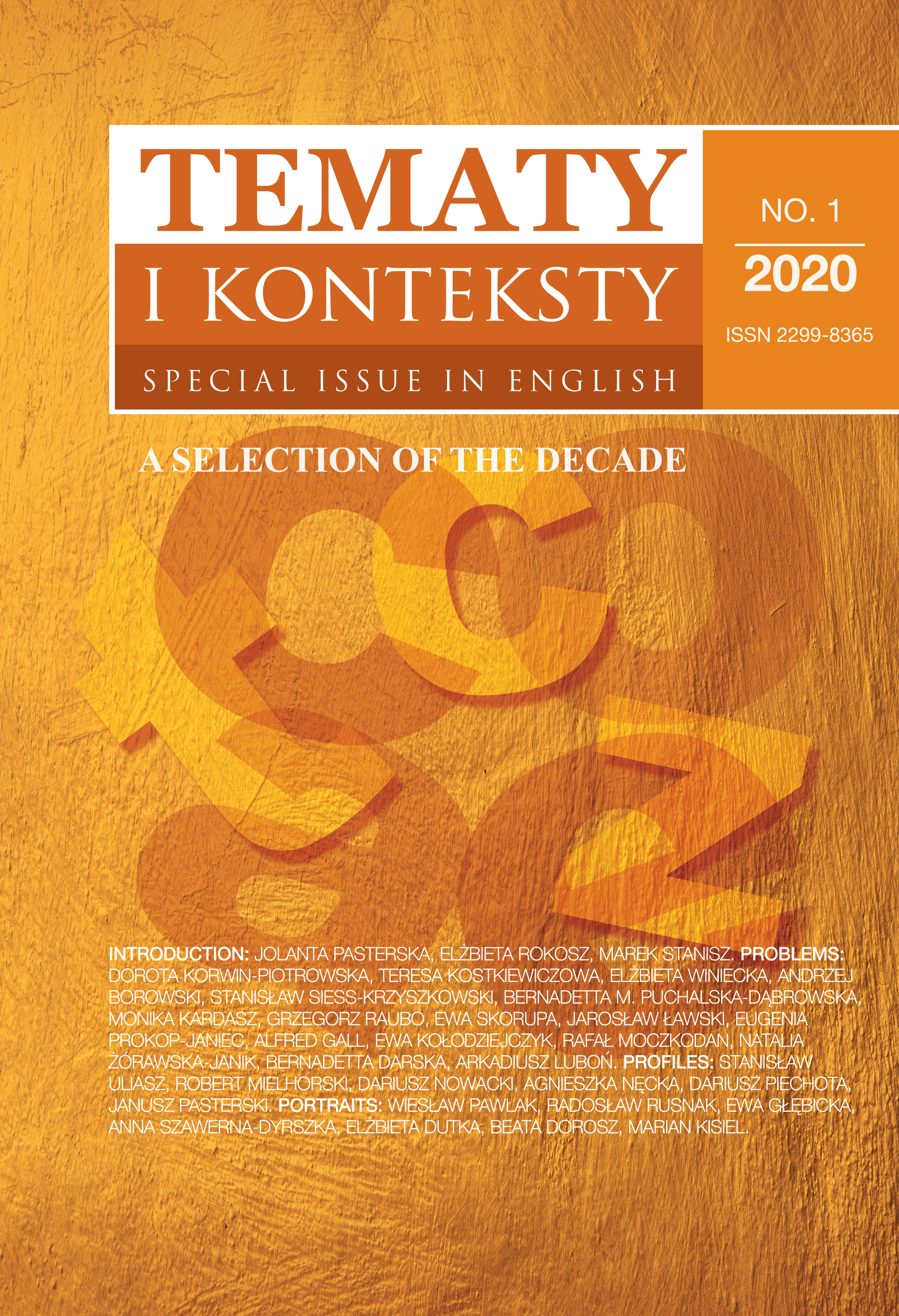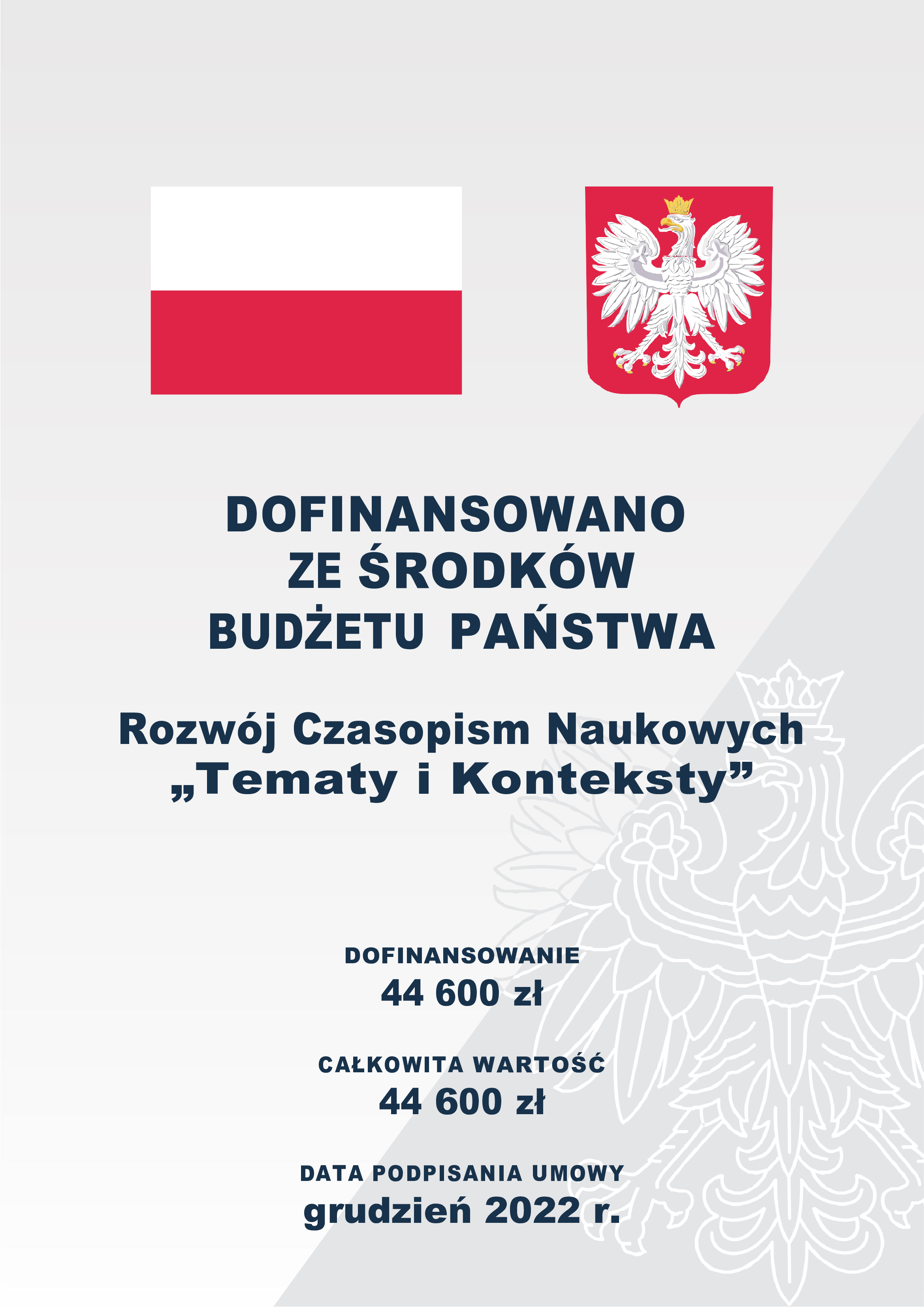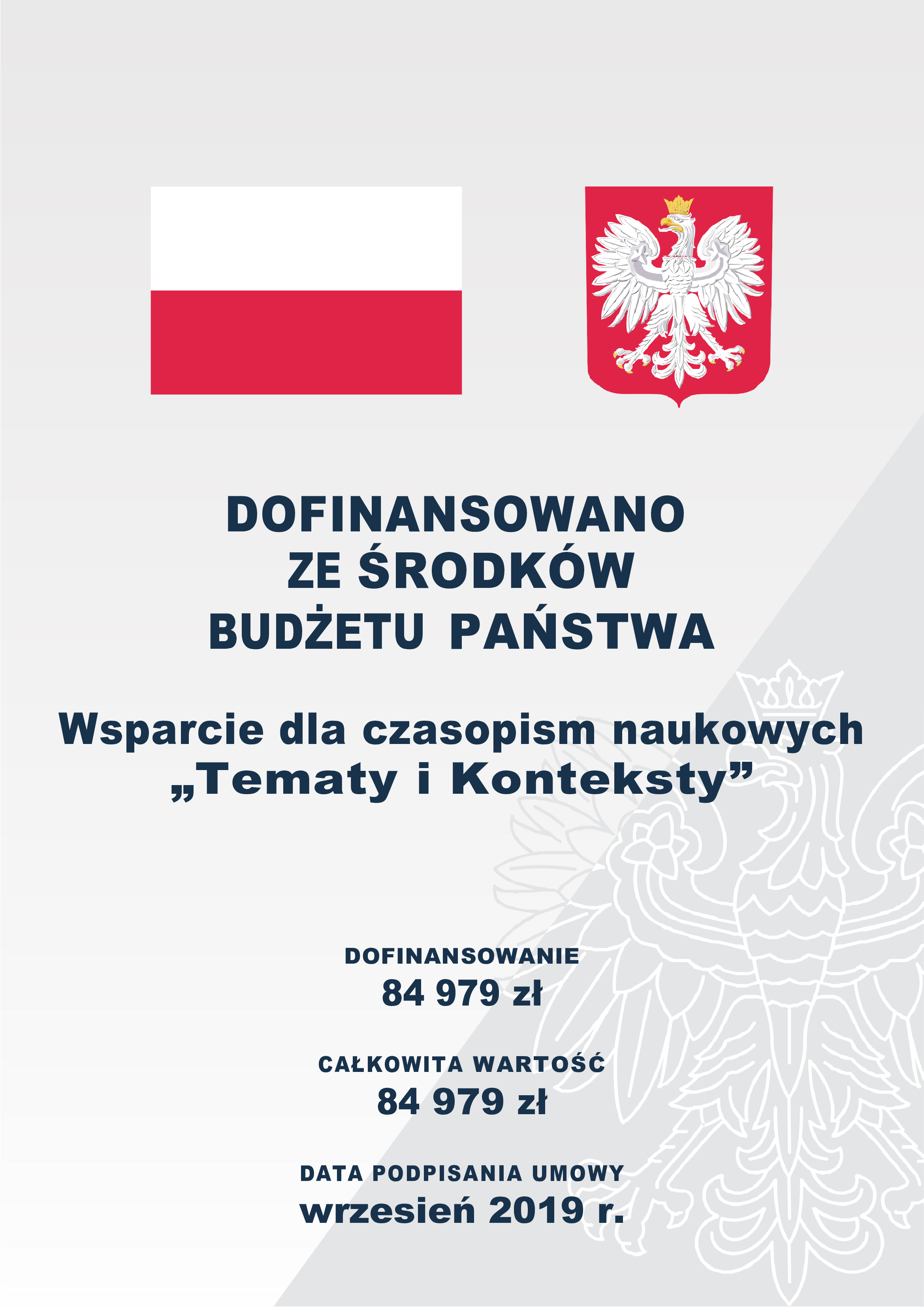Kresy (Polish Eastern Borderlands) in Polish Literature of 1918–2018. Significant Interpretative Perspectives
DOI:
https://doi.org/10.15584/tik.spec.eng.2020.18Słowa kluczowe:
Polish Eastern Borderlands, borderland discourse, Polish literature of 1918–2018, myths and legends, borderland of cultures, small homelands, controversies over the category of “Kresy” (Eastern Borderlands of Poland), postcolonial criticismAbstrakt
The paper offers a comprehensive, synthetic account of the discourse on the subject of the Polish Eastern Borderland over the course of the last hundred
years. It analyses the ways in which the understanding of the notion of Kresy and “borderland”, as well as the strategies for presenting the term, have changed, including attempts to replace this category with other terms. Furthermore, the paper characterises the dynamics concerning the transformations of situational contexts that emerged in the period of the Second Polish Republic, developed during World War II, after 1945 (in the country and abroad) and continuing from the 1980s and1990s to the present. Significant interpretative perspectives include, among others, the trends in literary schools, the legends and myths of the Polish Eastern Borderland, the notion of the borderline of cultures, small homelands, and methodological phrases and breakthroughs (spatial turn, geopoetics, postcolonial criticism).
Downloads
Bibliografia
Astafiew A., “Mifologema stepu i literatura stepu,” Kievski Połonistyczni Studji [Kiev] 2012, Vol. XIX.
Bakuła B., “Kolonialne i postkolonialne aspekty polskiego dyskursu kresoznawczego (zarys problematyki),” Teksty Drugie, 2006, No. 6.
Bakuła B., “Między wygnaniem a kolonizacją. O kilku odmianach polskiej powieści migracyjnej w XX wieku (na skromnym tle porównawczym),” in: Narracje migracyjne w literaturze polskiej XX i XXI wieku, edited by H. Gosk, Kraków: Towarzystwo Autorów i Wydawców Prac Naukowych Universitas, 2012.
Bartoszewicz J., Znaczenie polityczne Kresów Wschodnich dla Polski, Warszawa: Druk. “A. Michalski,” 1924.
Beauvois D., “Moja przygoda z Kresami,” Ruch Literacki, 1989, Issues 4–5.
Bieńkowski Z. Przyszłość przeszłości. Eseje, Wrocław: Wydawnictwo Dolnośląskie, 1996.
Birkenmajer J., Motywy i zagadnienia litewskie w literaturze polskiej, reprinted from Kuryer Polski, Milwaukee, [Wisconsin], [1939].
Błoński J., “Polski raj,” Tygodnik Powszechny 1987, No. 51–52.
Błoński J., “Bezładne rozważania starego krytyka, który zastanawia się, jak napisałby historię prozy polskiej w latach istnienia Polski Ludowej,” Teksty Drugie 1990, No. 1.
Brown K.. Kresy. Biografia krainy, której nie ma [A Biography of No Place. From Ethnic Borderland to Soviet Heartland], translated into Polish by A. Czwojdrak, Kraków: Wydawnictwo Uniwersytetu Jagiellońskiego, 2013.
Bujnicki T., “Pogranicze,” in: Kultura pogranicza wschodniego. Zarys encyklopedyczny, edited by T. Budrewicz, T. Bujnicki and J. S. Ossowski, Warszawa: Wydawnictwo “DiG,” 2011.
Bujnicki T., “Cywilizacyjny mit kresowy w literaturze o WXL. Wiek XIX,” in: Studia postkolonialne nad kulturą i cywilizacją polską, edited by K. Stępnik and D. Trześniowski , Lublin: Wydawnictwo Uniwersytetu Marii Curie-Skłodowskiej: 2010.
Czaplejewicz E., “Czym jest literatura kresowa?,” in: Kresy w literaturze. Twórcy dwudziestowieczni, edited by E. Czaplejewicz and E. Kasperski, Warszawa: “Wiedza Powszechna,” 1996.
Czaplejewicz E., Pragmatyka, dialog, historia. Problemy współczesnej teorii literatury, Warszawa: Państwowe Wydawnictwo Naukowe, 1990.
Czaplejewicz E., Kasperski E., Literatura i różnorodność. Kresy i pogranicza, Warszawa: Wydawnictwo “DiG,” 1996.
Czapliński P., “Kresowe narracje. Kresy Rzeczypospolitej. Wielki mit Polaków,” Polityka. Pomocnik Historyczny 2015, No. 2.
Czapliński P., Poruszona mapa. Wyobraźnia geograficzno-kulturowa polskiej literatury przełomu XX i XXI wieku, Kraków: Wydawnictwo Literackie, 2016
Czapliński P., Wzniosłe tęsknoty. Nostalgie w prozie lat dziewięćdziesiątych, Kraków: Wydawnictwo Literackie, 2001.
Czapliński P., Śliwiński P., Literatura polska 1976 – 1998. Przewodnik po prozie i poezji, Kraków: Wydawnictwo Literackie, 1999.
Dąbrowski B., “Postpamięć i trauma. Myśleć inaczej o literaturze małych ojczyzn (na przykładzie powieści Pawła Huellego i Stefana Chwina),” in: Nowe dwudziestolecie (1989–2009). Rozpoznania. Hierarchie. Perspektywy, edited by H. Gosk, Warszawa: Dom Wydawniczy Elipsa, 2010.
Dąbrowski M., Projekt krytyki etycznej. Studia i szkice literackie, Kraków: Towarzystwo Autorów i Wydawców Prac Naukowych Universitas, 2005.
Dąbrowski M., “Kresy w perspektywie krytyki postkolonialnej,” Porównania 2008, No. 5.
Dąbrowski M., Swój/obcy/inny. Z problemów interferencji i komunikacji międzykulturowej, Izabelin: “Świat Literacki,” 2001.
Domańska E., “Epistemologie pograniczy,” in: Na pograniczach literatury, edited by J. Fazan, K. Zajas, Kraków: Towarzystwo Autorów i Wydawców Prac Naukowych Universitas, 2012.
Drewnowski T., Próba scalenia. Obiegi – wzorce – style, Warszawa: Wydawnictwo Naukowe PWN, 1997.
Dubyk H., Sen o Ukrainie. Pogłosy “szkoły ukraińskiej” w literaturze polskiej dwudziestolecia międzywojennego, Warszawa: Wydawnictwo UKSW, 2014.
Dutka E., Próby topograficzne. Miejsca i krajobrazy w literaturze polskiej XIX i XXI wieku, Katowice: Wydawnictwo Uniwersytetu Śląskiego, 2014.
Dwie dekady nowej (?) literatury 1989–2009, edited by S. Gawliński and D. Siwor, Kraków: Wydawnictwo Uniwersytetu Jagiellońskiego, 2011.
Dwudziestolecie 1918 – 1939. Odkrycia. Fascynacje. Zaprzeczenia, edited by A.S. Kowalczyk, T. Wójcik, A. Zieniewicz, Warszawa: Dom Wydawniczy Elipsa, 2010.
Fiut A., Spotkania z Innym, Kraków: Wydawnictwo Literackie, 2006.
Galician Polyphony. Places and Voices, edited by A. Molisak and J. Wierzejska, Warszawa: Dom Wydawniczy Elipsa, 2015.
Gosk H., Opowieści “skolonizowanego/kolonizatora”. W kręgu studiów postzależnościowych nad literaturą polską XX i XXI wieku, Kraków: Towarzystwo Autorów i Wydawców Prac Naukowych Universitas, 2010.
Gosk H., “Polski dyskurs kresowy w niefikcjonalnych zapisach międzywojennych. Próba lektury w perspektywie ‘postcolonial studies’,” in: Dwudziestolecie 1918–1939. Odkrycia. Fascynacje. Zaprzeczenia, edited by A.S. Kowalczyk, T. Wójcik, A. Zieniewicz, Warszawa: Dom Wydawniczy Elipsa, 2010.
Gosk H., “Polskie opowieści w dyskurs postkolonialny ujęte,” in: (Nie)obecność. Pominięcia i przemilczenia w narracjach XX wieku, edited by H. Gosk, B. Karwowska, Warszawa: “Elipsa,” 2008.
Habielski R., “Utopia kraju lat dziecinnych (Emigracja powojenna wobec Kresów),” Kresy 1995, No. 2(22).
Hadaczek B., “Duma o Kresach Rzeczypospolitej (osnuta na motywach literackich),” Rocznik Lwowski, Warszawa 2010-2011, pp. 215–221.
Hadaczek B., Historia literatury kresowej, Kraków: Towarzystwo Autorów i Wydawców Prac Naukowych Universitas, 2011.
Hadaczek B., Kresówki (Kresy w literaturze polskiej), Szczecin: Volumina, 2011.
Janion M., “Róża i cierń Ukrainy,” Znak 1989, No. 9
Janion M., “Róża i cierń Ukrainy,” in: eadem, Wobec zła. Chotomów: “Verba,” 1989.
Jarzębski J., W Polsce czyli wszędzie. Szkice o polskiej prozie współczesnej, Warszawa: Wydawnictwo PEN, 1992.
Jasiewicz K., Zagłada polskich Kresów. Ziemiaństwo polskie na Kresach Północno-Wschodnich Rzeczypospolitej pod okupacją sowiecką 1939–1941. Studium z dziejów zagłady dawnego narodu politycznego, Warszawa: Oficyna Wydawnicza Volumen, 1998.
Kasperski E., “Kategoria pogranicza w badaniach literackich. Problemy metodologiczne,” in: Pogranicze kulturowe (odrębność – wymiana – przenikanie – dialog). Studia i szkice, edited by O. Weretiuk, J. Wolski, G. Jaśkiewicz, Rzeszów: Wydawnictwo Uniwersytetu Rzeszowskiego, Stowarzyszenie Literacko-Artystyczne “Fraza,” 2009.
Kasperski E., “Kresy, pogranicza, mity. O metodologii badań nad literaturą kresową,” in: E., Czaplejewicz, Kasperski E., Literatura i różnorodność. Kresy i pogranicza, Warszawa: Wydawnictwo “DiG,” 1996.
Kersten K., “Jałta – mit i rzeczywistość,” in: Jałta z perspektywy półwiecza, edited by S. Nicieja, Opole: Instytut Historii Uniwersytetu Opolskiego, 1995.
Kieniewicz S., “Kresy. Przemiany terminologiczne w perspektywie dziejowej,” Przegląd Wschodni 1991, Vol. I, issue 1.
Kieniewicz S., “Kresy. Problem Litwy i Rusi w dobie porozbiorowej,” Tygodnik Powszechny 1989, No. 46.
Kiersnowski R., “Kresy przez małe i przez wielkie ‘K’ – kryteria tożsamości,” in: Kresy – pojęcie i rzeczywistość, a collection of essays edited by K. Handke, Warszawa: Slawistyczny Ośrodek Wydawniczy, 1997.
Klimowicz M., “Retoryczność polskiego dyskursu postkolonialnego,” in: Studia postkolonialne nad kulturą i cywilizacją polską, edited by K. Stępnik and D. Trześniowski, Lublin: Wydawnictwo Uniwersytetu Marii Curie-Skłodowskiej: 2010.
Kolbuszewski J., “Dramat pomniejszania granic,” Odra 1989, No. 11.
Kolbuszewski J., Kresy, Wrocław: Wydawnictwo Dolnosląskie, 1995.
Kolbuszewski J., “Kresy jako kategoria aksjologiczna,” in: Kresy – pojęcie i rzeczywistość, a collection of essays edited by K. Handke, Warszawa: Slawistyczny Ośrodek Wydawniczy, 1997.
Kolbuszewski J., “Legenda Kresów w literaturze polskiej XIX i XX wieku,” in: Między Polską etniczną a historyczną, edited by W. Wrzesiński, Wrocław: Zakład Narodowy im. Ossolińskich, 1988.
Kopka K., “Powrót Kresów,” Tygodnik Literacki 1991, No. 13–14.
Kossak-Szczucka Z., Pożoga. Wspomnienia z Wołynia 1917–1919, Rzeszów: Wydawnictwo Resovia, 1990.
Kossak-Szczucka Z., Pożoga. Wspomnienia z Wołynia 1917–1919, Katowice-Cieszyn: Księgarnia św. Jacka, Towarzystwo im. Zofii Kossak, 1990.
Kossak-Szczucka Z., Pożoga. Wspomnienia z Wołynia 1917–1919, Warszawa: Instytut Wydawniczy PAX, 1996.
“Kresomania. An interview with Prof. Daniel Beauvois held by A. Sabor,” Książki w Tygodniku. A supplement to Tygodnik Powszechny 2006, No. 13.
Kresowa walczy w Italii, edited by L. Paff, Italia: 1945.
“Kresowy Polonez,” Biuletyn Koła Lwowian 1985, No. 49.
Kresy – dekonstrukcja, edited by K. Trybuś, J. Kałążny, R. Okulicz-Kozaryn, Poznań: Wydawnictwo Poznańskiego Towarzystwa Przyjaciół Nauk, 2007.
Kresy – pojęcie i rzeczywistość, a collection of essays edited by K. Handke, Warszawa: Slawistyczny Ośrodek Wydawniczy, 1997.
“Kresy Rzeczpospolitej. Wielki mit Polaków,” Polityka. Pomocnik Historyczny 2015, No. 2.
Kresy w literaturze. Twórcy dwudziestowieczni, edited by E. Czaplejewicz and E. Kasperski, Warszawa: “ Wiedza Powszechna,” 1996.
Krzyżanowski J.R., “A paradise lost? The image of „Kresy” in contemporary Polish literature,” American Contributions to the Eighth International Congress of Slavists, Vol. 2, Columbus, Ohio 1978.
Krzyżanowski J.R., “Kresy w powieści powojennej,” in: Antologia polskiej krytyki literackiej na emigracji 1945–1985, selection of works, introduction and biograms provided by J. Dąbała, Lublin: Wydawnictwo KUL, 1992.
Kultura pogranicza wschodniego. Zarys encyklopedyczny, edited by T. Budrewicz, T. Bujnicki and J. S. Ossowski, Warszawa: Wydawnictwo “DiG,” 2011.
Kurzowa Z., Elementy kresowe w języku powieści powojennej, Warszawa: Państwowy Instytut Wydawniczy, 1975.
Lednicki W., Pamiętniki, vol. 1, London: R. Swiderski, 1963.
Les confins de l’ancienne Pologne. Ukraine, Lituanie, Bielorussie XVI – XX siecles, edited by D. Beauvois, preface Czesław Miłosz, Lille: Presses Universitaires de Lille, 1988.
Majewska W., Z Lwowskiej Fali do Radia Wolna Europa, Wrocław: Wydawnictwo Dolnośląskie, 2006.
“Malownicza ruina utopii. Rozmowa z prof. Jackiem Kolbuszewskim, autorem książki ‘Kresy’,” Polityka 1995, No. 48.
Markowski M.P., O reprezentacji, in: Kulturowa teoria literatury. Główne pojęcia i problemy, edited by M.P. Markowski, R. Nycz, Kraków: Towarzystwo Autorów i Wydawców Prac Naukowych Universitas, 2012.
Mazur A., “Imiona Księgi Kresowej,” Kresy 1991, No. 8.
Meysztowicz W., Poszło z dymem. Gawędy o czasach i ludziach, Warszawa: Oficyna Wydawnicza “Pokolenie,” 1989.
Mieroszewski J., Finał klasycznej Europy, selected and prefaced by Rafał Habielski, Lublin: Wydawnictwo UMCS, 1997.
Między Polską etniczną a historyczną, edited by W. Wrzesiński, Wrocław: Zakład Narodowy im. Ossolińskich, 1988.
Miłosz C., “Rodziewiczówna,” Kultura (Paris) 1991, No. 3.
Miłosz C., Rodzinna Europa, Warszawa: “Czytelnik,” 1990.
Miłosz C., Szukanie ojczyzny, Kraków: Wydawnictwo Znak, 1996.
Mit Galicji, edited by J. Purchla et al., Kraków: Międzynarodowe Centrum Kultury, 2014.
Motyka G., “Rzeź wołyńska,” Polityka. Pomocnik Historyczny 2015, No. 2
Na pograniczach literatury, edited by J. Fazan, K. Zajas, Kraków: Towarzystwo Autorów i Wydawców Prac Naukowych Universitas, 2012.
Narracje migracyjne w literaturze polskiej XX i XXI wieku, edited by H. Gosk, Kraków: Towarzystwo Autorów i Wydawców Prac Naukowych Universitas, 2012.
Nesteruk M., “Kresy polskie – między arkadią i apokalipsą,” Przegląd Humanistyczny 1989, No. 10.
(Nie)obecność. Pominięcia i przemilczenia w narracjach XX wieku, edited by H. Gosk, B. Karwowska, Warszawa: “Elipsa,” 2008.
Nowe dwudziestolecie (1989 – 2009). Rozpoznania. Hierarchie. Perspektywy, edited by H. Gosk, Warszawa: Dom Wydawniczy “Elipsa,” 2010.
Nycz R., “Możliwa historia literatury,” in: Na pograniczach literatury, edited by J. Fazan, K. Zajas, Kraków: Towarzystwo Autorów i Wydawców Prac Naukowych Universitas, 2012.
O dialogu kultur wspólnot kresowych, edited by S. Uliasz, Rzeszów: Wydawnictwo Wyższej Szkoły Pedagogicznej, 1996.
Osęka P., “Utrata Kresów,” Polityka. Pomocnik Historyczny 2015, No. 2.
Paźniewski W., Gramatyka rozproszenia, Sosnowiec: “Offmax,” 1995.
Pięta I., “’Małe ojczyzny’ w prozie polskiej po 1989 roku,” in: Dwie dekady nowej (?) literatury 1989-2009, edited by S. Gawliński and D. Siwor, Kraków: Wydawnictwo Uniwersytetu Jagiellońskiego, 2011.
Pogranicze kulturowe (odrębność – wymiana – przenikanie – dialog). Studia i szkice, edited by O. Weretiuk, J. Wolski, G. Jaśkiewicz, Rzeszów: Wydawnictwo Uniwersytetu Rzeszowskiego, Stowarzyszenie Literacko-Artystyczne “Fraza,” 2009.
Pojęcie ojczyzny we współczesnych językach europejskich, edited by J. Bartmiński, Lublin: IEŚ-W, 1993.
Polskie mity polityczne XIX i XX wieku, edited by W. Wrzesiński, Wrocław: Wydawnictwo Uniwersytetu Wrocławskiego, 1994.
Poszukiwanie realności. Literatura – dokument – Kresy. Works devoted to Tadeusz Bujnicki, edited by S. Gawliński and W. Ligęza, Kraków: Towarzystwo Autorów i Wydawców Prac Naukowych Universitas, 2003.
Radyszewskij R., Polski romantiki “ukrajnskoj szkoli,” Kiev: 2009.
“Ręka opatrzności. Z Czesławem Miłoszem rozmawia S. Bereś,” Odra 1997, No. 12.
Ritz G., “Kresy polskiej w perspektywie postkolonialnej,” in: (Nie)obecność. Pominięcia i przemilczenia w narracjach XX wieku, edited by H. Gosk, B. Karwowska, Warszawa: “Elipsa,” 2008.
Ritz G., “Przeobrażenia stereotypu Ukraińca u Andrzeja Kuśniewicza i Wilhelma Macha,” in: O dialogu kultur wspólnot kresowych, edited by S. Uliasz, Rzeszów: Wydawnictwo Wyższej Szkoły Pedagogicznej 1996.
Rutkowski K., “Na Kresach czyli w domu,” Kultura (Paris) 1988, No. 10.
Rybicka E., “Miejsce, pamięć, literatura (w perspektywie geopoetyki),” Teksty Drugie 2008, No. 1–2.
Sapa D., Między polską wyspą a ukraińskim morzem. Kresy południowo-wschodnie w polskiej prozie lat 1918 – 1988, Kraków: Towarzystwo Autorów i Wydawców Prac Naukowych Universitas, 1998.
Sawicka J., Wołyń poetycki w przestrzeni kresowej, Warszawa: “DiG,” 1999.
Skirmuntt K., Idea jagiellońska a polityka kresowa, Wilno, 1925.
Skórczewski D., Teoria – literatura – dyskurs. Pejzaż postkolonialny, Lublin: Wydawnictwo Katolickiego Uniwersytetu Lubelskiego, 2013.
Stempowski J., “Etapy pewnego odwrotu,” Kultura (Paris) 1960, Issue 6/152.
Stempowski J., W dolinie Dniestru. Listy o Ukrainie, selected, edited and provided with an afterword by A.S. Kowalczyk. Warszawa: “LNB,” 1993.
Stempowski J., W dolinie Dniestru. Pisma o Ukrainie, selected, edited and provided with footnotes and an afterword by A.S. Kowalczyk, Warszawa: Towarzystwo “Więź,” 2014.
Studia postkolonialne nad kulturą i cywilizacją polską, edited by K. Stępnik and D. Trześniowski, Lublin: Wydawnictwo Uniwersytetu Marii Curie-Skłodowskiej: 2010.
Szaruga L., “Blaski i cienie koncepcji Międzymorza,” in: Na pograniczach literatury, edited by J. Fazan, K. Zajas, Kraków: Towarzystwo Autorów i Wydawców Prac Naukowych Universitas, 2012.
Szaruga L., “Problem literatury kresowej w okresie PRL-u,” Szczecińskie Prace Polonistyczne (“Kresy w literaturze”) 1994, No. 6.
Szaruga L., Dochodzenie do siebie. Wybrane watki literatury po roku 1989, Sejny: Pogranicze, 1997.
Szaruga L. “Kresy w prozie Teresy Lubkiewicz-Urbanowicz,” Szczecińskie Prace Polonistyczne („Kresy w literaturze”) 1999, No. 10.
Szaruga L., “Palimpsest Międzymorza (zarys problematyki),” Tekstualia 2008, No. 1(12).
Szczerek Z., Rzeczpospolita zwycięska. Alternatywna historia Polski, Kraków: Społeczny Instytut Wydawniczy Znak, 2013.
Szydłowska J., Narracje pojałtańskiego Okcydentu. Literatura polska wobec pogranicza na przykładzie Warmii i Mazur (1945 – 1989), Olsztyn: Wydawnictwo Uniwersytetu Warmińsko-Mazurskiego w Olsztynie, 2013.
Świeściak A., Melancholia w poezji polskiej po 1989 roku, Kraków: Towarzystwo Autorów i Wydawców Prac Naukowych Universitas, 2010.
Święch J., “W Polsce, czyli na Kresach,” Kresy 1992, No. 12.
Taylor N., “Dziedzictwo W.X. Litewskiego w literaturze emigracyjnej,” Kultura (Paris) 1986, No. 10 (469).
Terelecki T., “O ‘Wiadomościach’ bezprzymiotnikowych,” Wiadomości (London) 1955, No. 51/52.
Thompson M.E., Trubadurzy imperium. Literatura rosyjska i kolonializm, translated by A. Sierszulska, Kraków: Towarzystwo Autorów i Wydawców Prac Naukowych Universitas, 2000.
Tomaszewski M., “Między Atlantydą a Dzikimi Polami,” Zeszyty Literackie (Paris) 1992, No. 24.
Tułacz, “Kłaniam się Tobie…,” Biuletyn Koła Lwowian [London] 1987, No. 53.
Uliasz S., Literatura Kresów – kresy literatury. Fenomen Kresów Wschodnich w literaturze polskiej dwudziestolecia międzywojennego, Rzeszów: Wydawnictwo Wyższej Szkoły Pedagogicznej, 1994.
Uliasz S., O literaturze Kresów i pograniczu kultur. Rozprawy i szkice, Rzeszów: Wydawnictwo Uniwersytetu Rzeszowskiego, 2001.
Uliasz S., “Z dziejów motywu stepu w polskiej literaturze Kresów,” in: Poszukiwanie realności. Literatura – dokument – Kresy. Works devoted to Tadeusz Bujnicki, edited by S. Gawliński and W. Ligęza, Kraków: Towarzystwo Autorów i Wydawców Prac Naukowych Universitas, 2003.
Uliasz S., “Z problemów polskiej literatury kresowej,” in: Pejzaże kultury. Prace ofiarowane Profesorowi Jackowi Kolbuszewskiemu w 65. rocznicę Jego urodzin, edited by W. Dynak and M. Ursel, Wrocław: Wydawnictwo Uniwersytetu Wrocławskiego, 2005.
Wańkowicz M., Anoda i katoda. Było to dawno, selection, arrangement, and edition of the texts T. Jodełka-Burzecki, Kraków–Wrocław: Wydawnictwo Literackie, 1986.
Wawrzyczek I., “Badanie kultury polskiej w perspektywie światowych studiów postkolonialnych,” in: Studia postkolonialne nad kulturą i cywilizacją polską, edited by K. Stępnik and D. Trześniowski, Lublin: Wydawnictwo Uniwersytetu Marii Curie-Skłodowskiej, 2010.
Wiegandt E., “Podróż z Kresów do Europy Środkowej,” in: Kresy – dekonstrukcja, edited by K. Trybuś, J. Kałążny, R. Okulicz-Kozaryn, Poznań: Wydawnictwo Poznańskiego Towarzystwa Przyjaciół Nauk, 2007.
Wiegandt E., “Literackie formy świadomości kresowej,” Polonistyka 1997, No. 4.
Wiegandt E., “Literacka kariera małych ojczyzn,” in: Słowa i metody. Księga dedykowana profesorowi Jerzemu Święchowi, edited by A. Kochańczyk, A. Niewiadomski, B. Wróblewski, Lublin: Wydawnictwo Uniwersytetu Marii Curie-Skłodowskiej, 2009.
Wiegandt E., “Podróż z Kresów do Europy Środkowej,” in: Kresy – dekonstrukcja, edited by K. Trybuś, J. Kałążny, R. Okulicz-Kozaryn, Poznań: Wydawnictwo Poznańskiego Towarzystwa Przyjaciół Nauk, 2007.
Wiegandt E., “’Pogranicze’ jako kategoria interpretacyjna literatury małych ojczyzn,” in: Na pograniczach literatury, edited by J. Fazan, K. Zajas, Kraków: Towarzystwo Autorów i Wydawców Prac Naukowych Universitas, 2012.Wierciński A., Przywracanie pamięci, 2nd extended edition, Opole: Wydawnictwo Uniwersytetu Opolskiego, 1997.
Wisner H., Wojna nie wojna. Szkice z przeszłości polsko-litewskiej, Warszawa: “Książka i Wiedza,” 1978.
Witkowski L., “Bogactwo Kresów – między pograniczem kultury a kulturą pogranicza,” in: Kresy w literaturze. Twórcy dwudziestowieczni, edited by E. Czaplejewicz and E. Kasperski, Warszawa: „Wiedza Powszechna,” 1996.
Witkowski L., Uniwersalizm pogranicza. O semiotyce kultury Michała Bachtina w kontekście edukacji, Toruń: Adam Marszałek, 1991.
“Z Kresów na Kresy. Wielkie przesiedlenie Polaków,” Polityka. Pomocnik Historyczny 2016, No. 4.
Zadencka M., W poszukiwaniu utraconej ojczyzny. Obrazy Litwy i Białorusi w twórczości pisarzy emigracyjnych (Florian Czarnyszewicz, Michał Kryspin Pawlikowski, Maria Czapska, Czesław Miłosz, Józef Mackiewicz), Uppsala: AUU, 1995.
Ziejka F., Nasza rodzina w Europie. Studia i szkice, Kraków: Towarzystwo Autorów i Wydawców Prac Naukowych Universitas, 1995.
Ziemilski A., “Miasto kresowe Polski międzywojennej: mit i rzeczywistość,” Odra 1983, No. 4.
Zieniewicz A., “Czesława Miłosza „Wyprawa w Dwudziestolecie” jako ekskursja w podświadomość III RP,” in: Nowe dwudziestolecie (1989 – 2009). Rozpoznania. Hierarchie. Perspektywy, edited by H. Gosk, Warszawa: Dom Wydawniczy Elipsa, 2010.
Żurawski P. vel Grajewski, Kresy – dzieje pewnego pojęcia, www. teologiapolityczna.pl, accessed on 3.02.2018.
Pobrania
Opublikowane
Jak cytować
Numer
Dział
Licencja
Prawa autorskie (c) 2021 Tematy i Konteksty

Utwór dostępny jest na licencji Creative Commons Uznanie autorstwa – Użycie niekomercyjne – Bez utworów zależnych 4.0 Międzynarodowe.




